Key takeaways:
- Effective vendor management involves nurturing relationships through clear communication, trust, and personalized interactions.
- Strong vendor relationships lead to flexibility, innovation, and better outcomes in event management.
- Establishing clear criteria when selecting vendors and seeking feedback from others can enhance decision-making.
- Regular check-ins and constructive feedback are essential for managing vendor performance and fostering growth.
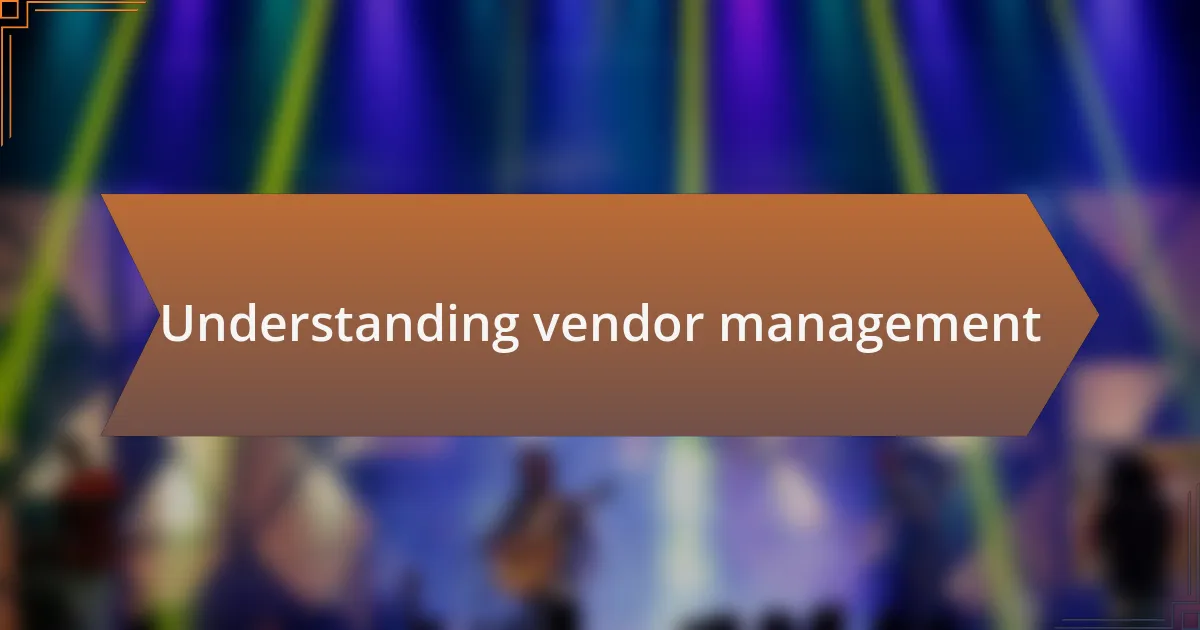
Understanding vendor management
Vendor management is the process of establishing and maintaining relationships with suppliers to ensure that an organization receives high-quality products and services at competitive prices. I remember when I first started in event management; having a solid grasp of vendor management helped me navigate complex situations, like negotiating better terms for catering services that ultimately delighted our clients. There’s a distinct satisfaction in building a network of reliable vendors that you can trust for every event.
One could argue that effective vendor management is akin to nurturing a garden—each vendor relationship requires care, communication, and a bit of personal touch. Have you ever had a vendor misunderstanding that left you scrambling? I have. It’s during these moments that I learned the importance of clear contracts and regular check-ins. Establishing trust and openness with your vendors can make all the difference in overcoming hurdles together.
Understanding the nuances of vendor management goes beyond just contracts and pricing; it involves recognizing and appreciating the human aspect. In my experience, a personal phone call or a simple thank-you note can transform a vendor relationship from transactional to collaborative. How often do we take the time to foster these connections? I’ve found that investing in relationships with vendors leads to better service, innovative ideas, and sometimes even special offers that can enhance your events.
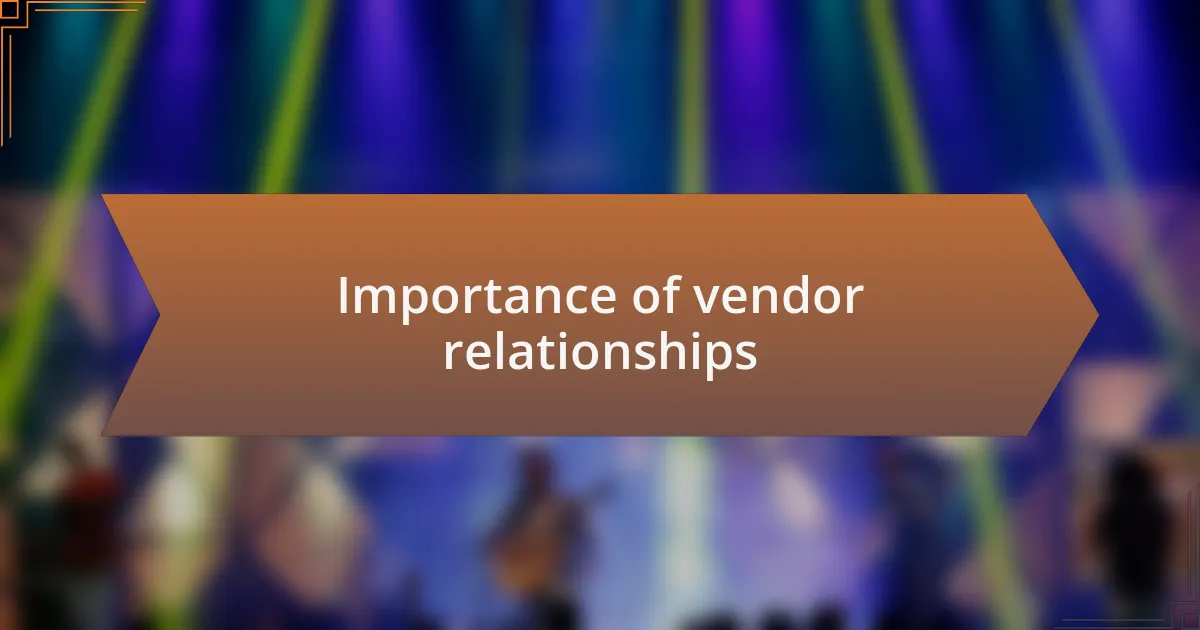
Importance of vendor relationships
Building strong vendor relationships is crucial in event management. I once organized a large conference and realized that my longstanding partnership with a local audio-visual company paid off. They offered me discounts and prioritized my needs over others—something I believe stemmed from our mutual respect and trust. It’s remarkable how investing time into these relationships can lead to significant benefits.
Collaboration can flourish when vendors see you as more than just a client. There was a time I was faced with an unexpected venue change just days before an event. Instead of panicking, I called my preferred catering vendor, and to my surprise, not only did they adjust on short notice, but they also offered creative menu ideas that matched the new space beautifully. In these scenarios, it’s the strength of the relationship that allows for flexibility and innovation—how often can we say that about every vendor?
Moreover, nurturing vendor relationships opens the door to valuable feedback. I recall a vendor who candidly shared insights on what typically works best for clients during events, especially concerning timelines and set-up. This exchange of information helped me refine my planning process and ultimately led to smoother events. Isn’t it fascinating how a simple conversation can lead to professional growth and better outcomes?
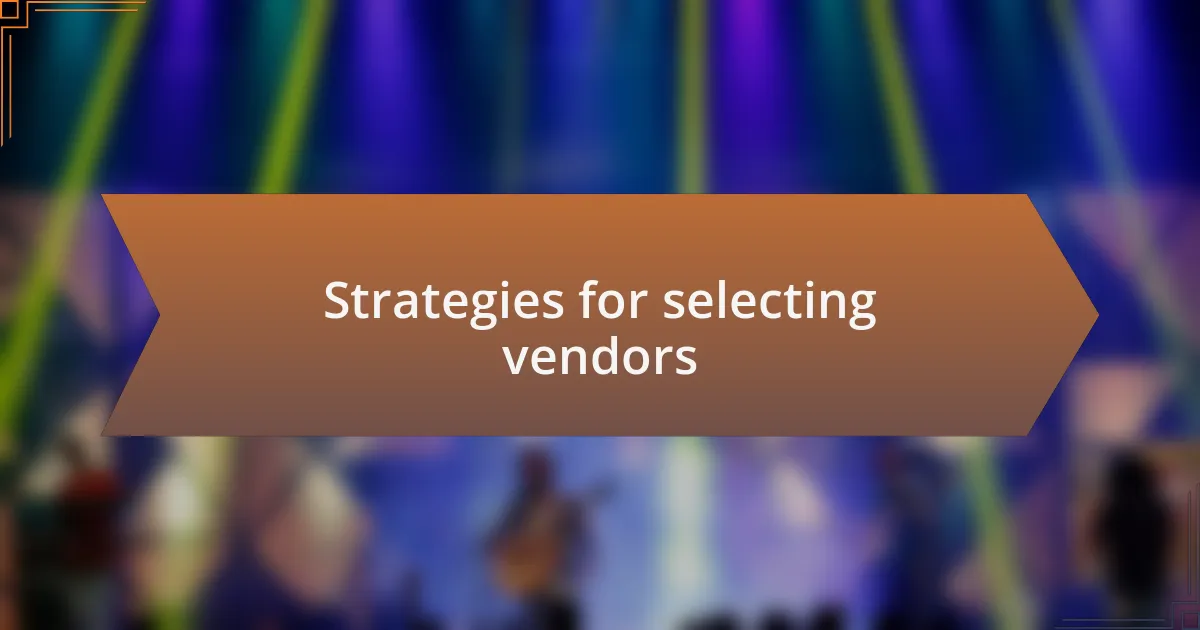
Strategies for selecting vendors
When selecting vendors, I find it invaluable to establish clear criteria based on my event’s specific needs. For example, during my last project, I created a checklist that included factors like reliability, previous work quality, and communication style. This systematic approach ensured I didn’t overlook essential aspects amidst the excitement of planning.
I also prioritize meeting potential vendors in person whenever possible. A memorable experience for me was meeting a florist at a local market. Their passion for floral design was evident in our conversation, and I felt confident their creativity would translate beautifully into my event. Trusting your instincts about a vendor’s enthusiasm can make a significant difference in the outcome.
Lastly, I recommend seeking feedback from others who have previously worked with potential vendors. I once reached out to a fellow event planner who had a long history with a specific photographer, and she had nothing but praise for their professionalism and ability to capture moments authentically. Hearing firsthand experiences can provide insights that aren’t apparent from a portfolio alone, allowing you to make a more informed decision.
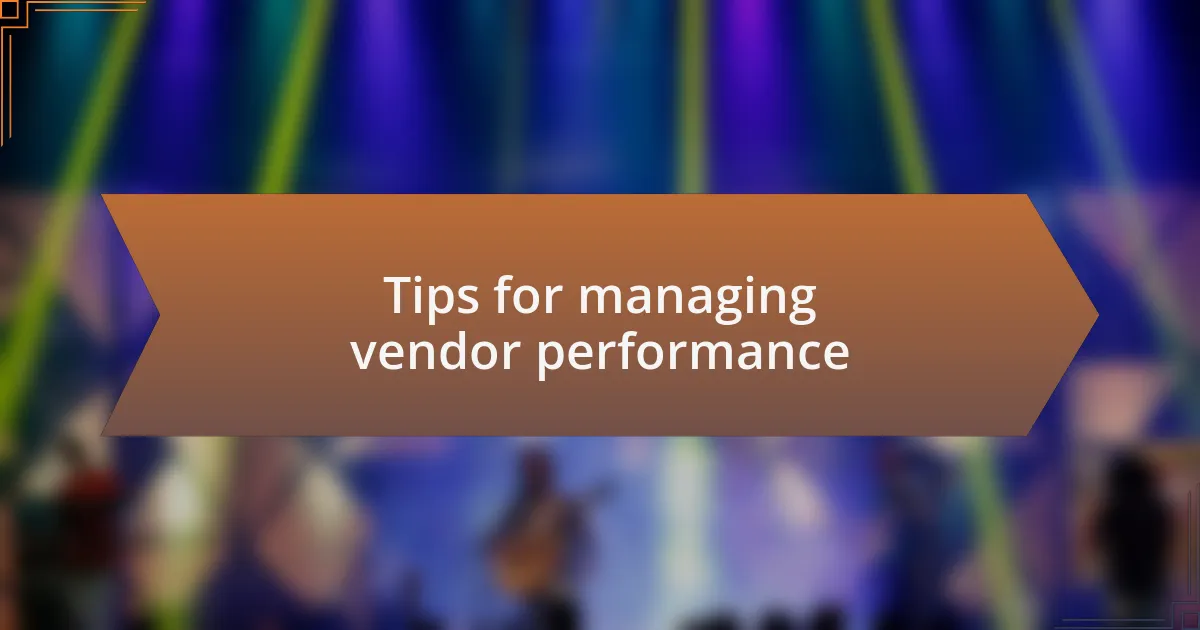
Tips for managing vendor performance
Managing vendor performance is an ongoing journey, not just a one-time assessment. One technique I find beneficial is to set up regular check-ins throughout the planning process. For instance, I remember a time when I reached out to my catering vendor weekly leading up to an event, ensuring we were aligned on timelines and expectations. These chats helped us address concerns proactively, avoiding any last-minute surprises. Isn’t it easier to tackle small issues before they balloon into bigger headaches?
Additionally, I believe in the power of constructive feedback. After an event, I make it a point to share my thoughts with the vendors involved. I had a graphic designer once who wasn’t aware that the color palette he chose didn’t align with our vision. By gently guiding him on what worked and what didn’t, I saw him evolve his style for future projects. Don’t you think these honest conversations ultimately strengthen the relationship?
Lastly, keeping a performance log is something I swear by. I jot down vendors’ key deliverables and any hiccups we encounter along the way. I recall a time when I had to pitch a vendor for a follow-up project. Having documented their performance helped me confidently present my case to my team, making our decision process smoother. Wouldn’t you agree that having a tangible record can streamline your evaluations?
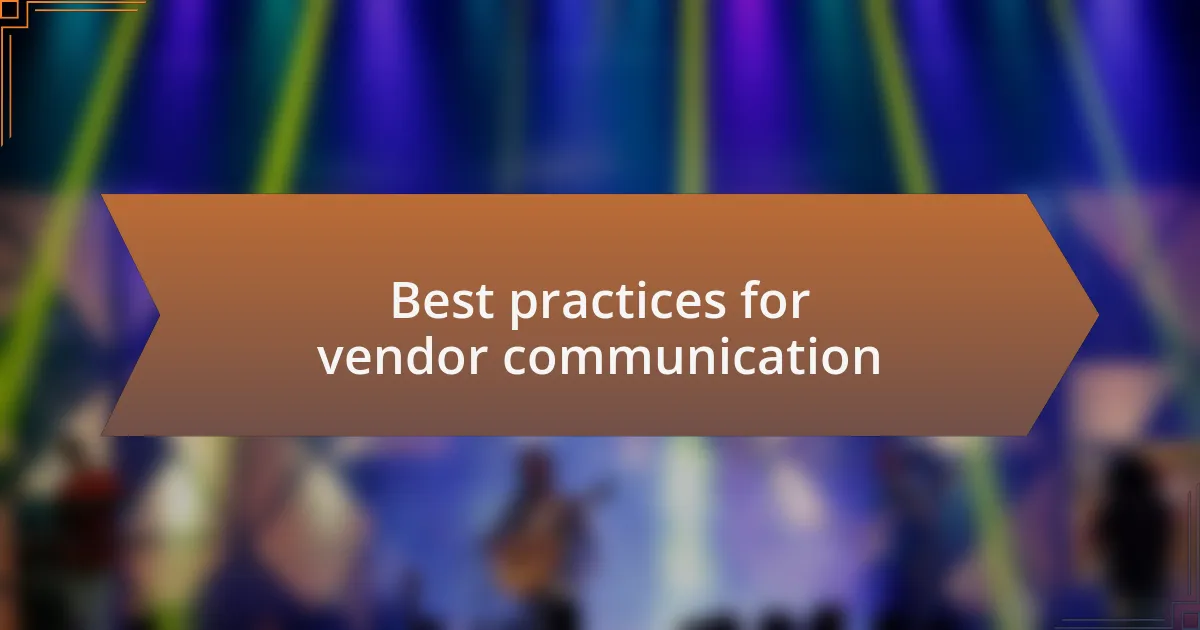
Best practices for vendor communication
Effective communication with vendors is vital. I believe in establishing clear expectations right from the start. During one event, I shared a detailed timeline with my audio-visual supplier, outlining what was needed at each phase. This clarity not only prevented misunderstandings but also fostered a sense of teamwork. Hasn’t a well-defined roadmap made your collaborations smoother too?
Using multiple communication channels is another tactic that works well for me. I often combine emails, phone calls, and even instant messaging apps to stay connected. I recall a particularly stressful moment when a last-minute change was needed for a venue layout. By quickly sending a message to my vendor through our agreed chat platform, we were able to resolve the issue promptly. Doesn’t having options in communication make it easier to address urgent matters?
Lastly, I always maintain a friendly yet professional demeanor in all interactions. Building rapport with vendors can make a huge difference. One time, I shared a coffee with a lighting technician to discuss our creative vision. That simple gesture led to a stronger bond, which benefited our collaboration later. Don’t you find that a little personal touch can go a long way in business relationships?
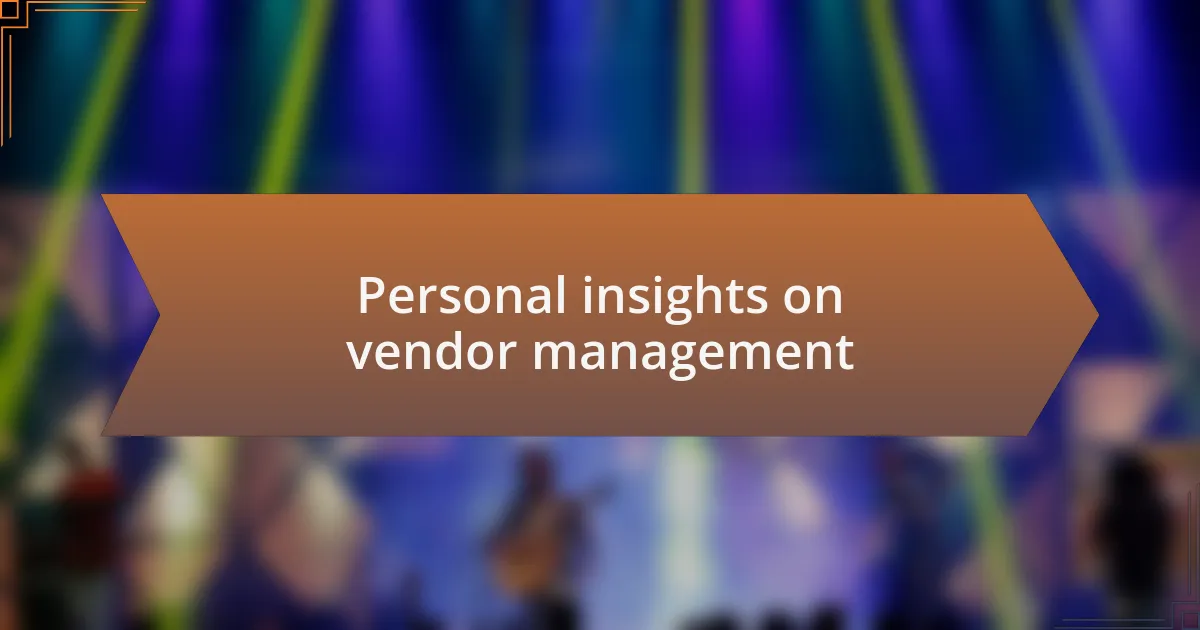
Personal insights on vendor management
In my experience, transparency has been a cornerstone of effective vendor management. I recall a situation where I faced a budget limit while negotiating with a caterer. By openly discussing my constraints, we found creative alternatives that satisfied both parties. Have you ever found that sharing limitations can lead to unexpected solutions?
I also place a strong emphasis on feedback loops. After each event, I sit down with my vendors to discuss what went well and what could be improved. This practice not only strengthens our relationship but also helps in refining processes for future collaborations. Reflecting on past experiences can really illuminate the way forward, can’t it?
Moreover, I trust my intuition when selecting vendors. There was a time when I felt uncertain about a vendor based on my initial impression. By trusting my gut and taking the time to look for alternatives, I ultimately partnered with a more reliable team. Haven’t you ever felt that sometimes your instinct serves you better than any contract?